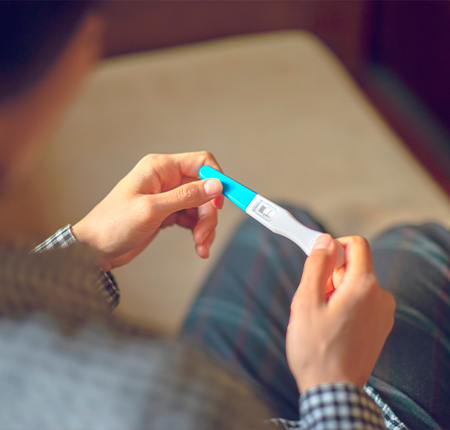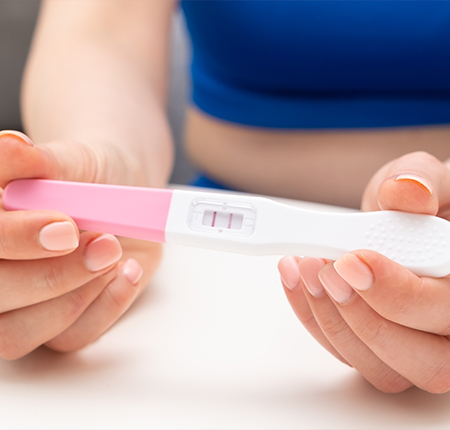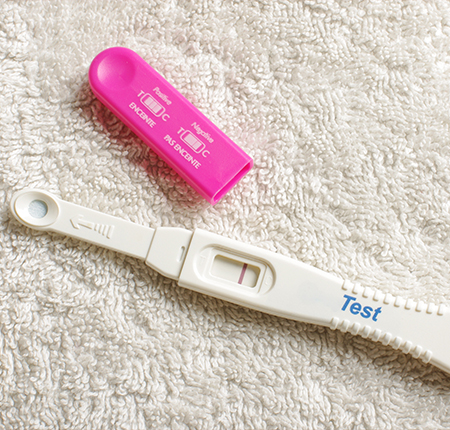
When your period is late and the pregnancy test is positive, but you do not have any pregnancy symptoms, it is possible that the result is a false positive. Although most tests are highly accurate, they cannot guarantee you 100% accuracy, and we know this can be confusing.
The pregnancy test and the time when you anticipate the result are already full of excitement, whether it is the long-awaited confirmation that you will become a mother, or an unwanted pregnancy. But the uncertainty of an invalid result can become a real source of stress and anxiety. Read the article and find out the causes of a false positive result, but also how to perform the home pregnancy test correctly.
What is a pregnancy test and how does it work?
The pregnancy test is a tool that you can use anytime at home to find out if you are pregnant or not.
The test measures the concentration of HCG in the urine (the level of this hormone increases during pregnancy) and if you use it correctly, the result is theoretically 99% accurate. On the Enroush blog we have an article where we told you all about pregnancy tests , how they work, how much they cost and how many types they are.
If the result of the pregnancy test is negative, it means that there is no pregnancy. If it is positive, then there is a high probability that you are pregnant. But there is also the situation where you get a false positive result, which tells you that you are pregnant when in fact you are not.
When should a pregnancy test be taken?
It is recommended to take a pregnancy test when, for various reasons, you suspect that you are pregnant.
It may be because your period is late after having unprotected sex, because you are nauseous and urinating often, or because you are experiencing any other early sign of pregnancy. I told about each of the first signs of pregnancy that could lead you to take a test HERE .
Ideally, you should take the test a week after your period is late. The HCG level will then be high enough to be detected in the urine. If you test too early, you may get a false negative. If you run out of patience, there are ultra-sensitive tests that can detect a pregnancy even before your period is late. It is important to read the instructions on the test package, because it says exactly how quickly you can do it.
And if you're wondering when is the best time of day to take a pregnancy test, the concentration of HCG in urine is highest in the morning. Before that, it was recommended to take the test immediately after waking up. Today, tests are sensitive enough to detect even low concentrations of HCG, so you don't have to worry - you can take the test at any time during the day.

How to do a pregnancy test correctly
There are several types of pregnancy tests, from pen to strip. The correct way to do them differs.
If you have, for example, a cassette test, you will need to collect a urine sample in a clean container, then use a pipette to add 3 drops to the appropriate area of the test. In a pen test, you can insert the absorbent end directly under the stream of urine for a few seconds.
Always read and follow the instructions on the packaging. There you will find step by step how to do it correctly and how to interpret the results. Also check the expiry date and do not use an expired pregnancy test.
Interpretation of the result
It is not enough to take the test according to the instructions, you must also interpret it correctly. Let's take the same examples above: in the box test, the results are read after 5 minutes, but not later than 10 minutes; with the pen type, you can read the results after only 3 minutes.
Also, the results will be displayed differently. A positive result can appear as a plus (+) or two lines, while a negative result can be illustrated by a minus (-) or a single line.
Also check the control and test areas, because the presence or absence of lines in inappropriate areas indicates that the test is invalid and you will need to repeat it. You will find all this information, again, on the packaging of each test.
What does a false positive result on a pregnancy test mean?
If the pregnancy test result is positive without you being pregnant or having any other pregnancy symptoms, it is called a false positive.
There are many reasons why you can get an incorrect result. So the false positive result may mean that you suffer from certain conditions, that you are undergoing certain treatments, or simply that you used the incorrect test.
Causes of a false positive pregnancy test result
Sometimes, even if you are careful and follow all the steps of taking the test as indicated on the package, it can happen that you get a false positive result.
It's an unpleasant situation, which can alarm you unnecessarily if you don't want a pregnancy and which can give you false hopes followed by disappointment if you want to become a mother. Here are some reasons why this can happen:
Chemical load
When the embryo is formed following fertilization but fails to implant in the uterine wall, the so-called pregnancy is called a chemical pregnancy. The body already starts producing HCG which the pregnancy test can detect in the urine even if the fetus is developing and the pregnancy will be lost.
Most chemical pregnancies actually go undiagnosed precisely because the only way to detect them is with a pregnancy test.

Miscarriage
After a miscarriage, the level of HCG begins to decrease. But it does it gradually, at a slow rate, so it can stay in the urine for up to 6 weeks. A pregnancy test during this period can still detect the presence of the hormone even if the previous pregnancy was lost and there is no new pregnancy.
Ectopic (extrauterine) pregnancy
It is called an extrauterine, or ectopic, pregnancy when the egg is fertilized but implants outside the uterus, not inside. It can remain in the fallopian tubes, an ovary, the cervix, or other abdominal regions.
It is a pregnancy that will not be able to continue because the baby is only developing inside the womb. It also needs to be treated urgently as it can be harmful to the mother. We have another article on the blog where we talked more extensively about everything that ectopic pregnancy means .
The HCG level in an ectopic pregnancy is usually lower and much harder to detect than in a normal pregnancy. And yet, some tests will detect it and give you a false positive even if the pregnancy cannot be carried to term.
Certain medications
Medicines used to treat infertility or to improve the chances of getting pregnant contain HCG. It can also be found in anticonvulsants and diuretics. If you are on such treatment, the test may detect the increased level of HCG and you may get a false positive result.
Medical conditions
There are several health problems that can cause the level of HCG in the body to rise. These include kidney or liver disease, endocrine gland disorders, and ovarian, lung, breast, stomach, or bladder cancer. If you suffer from any of these problems, there is a risk of getting a false positive result after taking the pregnancy test.
Other conditions that can cause a false positive result are ovarian cysts, premenopause, menopause and gestational trophoblastic disease which can cause tumors in the cells that normally make up the placenta.
Incorrect use of the pregnancy test
There are many situations in which the incorrect use of the test decreases its accuracy. For example, when you use an expired test. Or when you wait longer than the time indicated on the package and read it too late. If you find yourself in this situation, the result is not valid and it is recommended to take a new test.
The presence of the evaporation line
With tests that display lines when they show you the result, you have to be very careful with interpretation. A second line may appear on the test, but be erased or very faintly colored. That doesn't necessarily mean there is a charge, it could just be the evaporation line. The result is a false positive if you interpret the evaporation line as charge.

When is the time to visit the doctor if you have a false positive pregnancy test
The first step after a positive pregnancy test, whether fake or genuine, is to repeat it. The chances of getting a false positive twice in a row are small, and a second positive result can confirm your pregnancy. As soon as it is confirmed, it is time to go to the doctor for follow-up.
Even when there is no pregnancy, it is important to go to the doctor as soon as possible if you get a false positive result and it is followed by vaginal bleeding, abdominal cramps and other unusual symptoms. In the medical office, you can have blood tests or an ultrasound that will confirm with certainty whether you are pregnant or not.
Treatment for false positive pregnancy test
What you can do if you get a false positive pregnancy test is to discuss it with your doctor. He will pinpoint the cause, whether you are following certain treatments or suffering from a condition that increases your HCG levels in your body.
Depending on that, he will recommend either a change of medication or the necessary treatment for certain diseases.
How to avoid a false positive pregnancy test
A false positive pregnancy test can become a real source of stress, confusion and disappointment, so it is normal that no woman wants to end up in this situation. Here are some recommendations that will help you avoid a false positive result following the pregnancy test:
Always read the instructions. Follow step by step the recommendations written on the pregnancy test packaging, from its performance to the way of interpretation.
Check the expiration date. Do not use tests that have passed the expiration date written on the package.
Talk to your doctor about the medications you are taking. Do not self-medicate and inform your doctor if you wish to become pregnant so that he can adjust your treatment so that it does not affect the level of HCG in your body.
Do blood tests. If you want to be safe and there is no doubt, opt for a blood pregnancy test. This has the disadvantage that you cannot do it yourself at home, but it is very rare that the result is false.






















